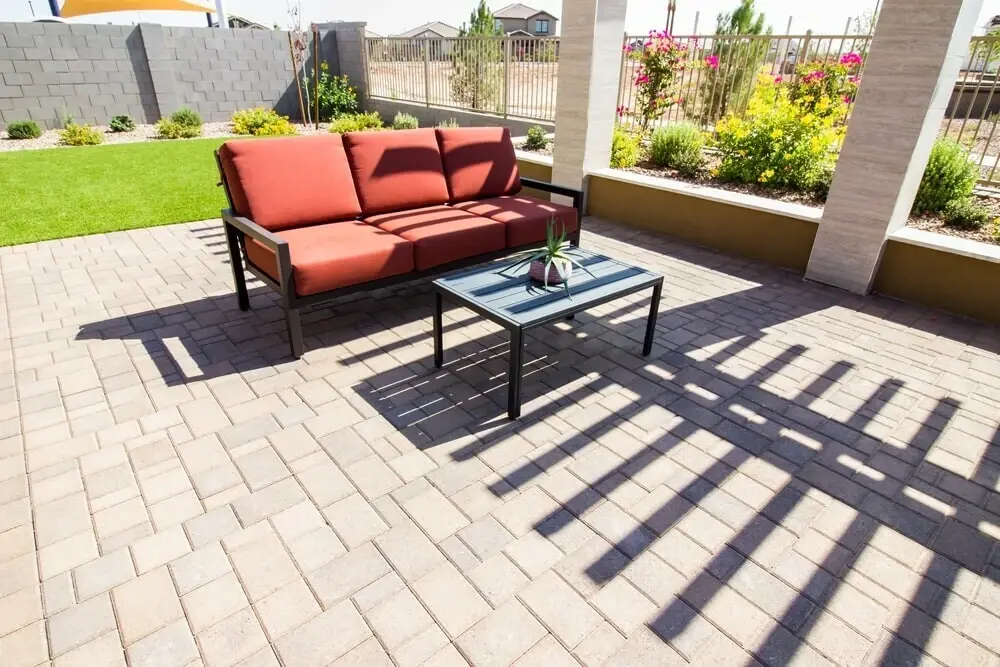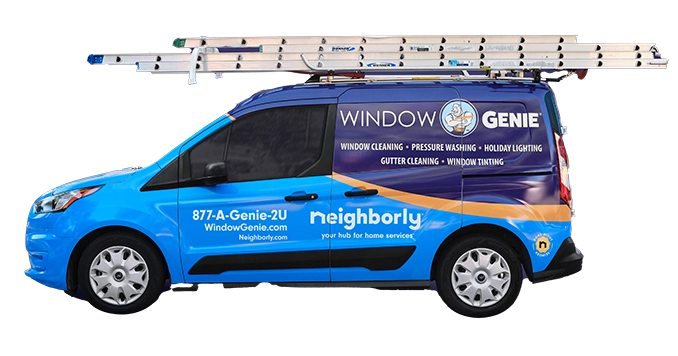
Whether you’re a new homeowner looking to maintain the beauty of your patio or a seasoned DIY enthusiast seeking effective cleaning methods, Window Genie is here to help.
From step-by-step instructions on cleaning techniques to tips for avoiding common mistakes, we have the expertise to keep your pavers looking sharp and extend their lifespan. Read on to discover how to achieve a stunning, well-maintained patio.
How to Clean Concrete Pavers, Step-by-Step
Despite the remarkable durability of pavers, you can extend their longevity even further with regular cleaning and maintenance. Proper maintenance improves their appearance and ensures their long-term health and function.
We recommend having a professional clean your patio at least once a year for the best results; however, you can also perform a DIY cleaning between those services. Here, we will provide step-by-step instructions on how to clean your pavers without a pressure washer.
1. Clear the Area for Cleaning
The first step is to clear the area for cleaning. It’s important to ensure the surface is clear before moving on to deeper cleaning. Start by sweeping the pavers with a broom or using a leaf blower to remove any loose debris, such as leaves, dirt, or twigs.
Remove any furniture, potted plants, or other objects that might be on top of your pavers to prevent missing any spots during cleaning.
2. Remove Vegetation
Next, you should tidy up any weeds or other vegetation that might be growing between your pavers. Weeds can damage pavers over an extended period, so we recommend using an anti-weed solution if your pavers often have weeds growing in them.
For this step, you can use a weed trimmer, or weed killer, or manually pull out the weeds and grasses, depending on how much vegetation your paver has. Eliminating unsightly weeds and vegetation will prevent them from interfering with the cleaning and maintenance of your pavers.
3. Douse Your Pavers With Water
Using plain water, thoroughly hose down and rinse your pavers. Afterward, fill a bucket with warm water and add a mild detergent or specialized paver cleaning solution. Be sure to follow the manufacturer’s instructions for the appropriate dilution ratio of water and paver cleaner before thoroughly mixing the solution until it is well combined.
If you do not have a mild detergent or specialized paver cleaner, dish soap and degreaser will work just as well. Avoid acidic solutions that may damage your concrete.
4. Gently Scrub Your Pavers
Use a broom or another stiff brush to scrub down your pavers. For this step, you do not need to scrub hard; you just need to remove surface-level dirt and stains. Avoid using wire-bristle brushes or steel pads, as these can scratch and damage the applied sealant.
Dip the stiff bristle brush or broom into the cleaning solution and scrub the pavers in a circular motion. Pay extra attention to any stained or heavily soiled areas and continue scrubbing until you cover the entire surface of the paver.
5. Rinse Down Your Pavers
After thoroughly scrubbing your pavers, rinse the surface with a garden hose equipped with a spray nozzle. Use moderate water pressure to remove the cleaning solution and any remaining dirt. Make sure to completely rinse the pavers and ensure no residue or lingering grime is left behind.
Feel free to repeat this process as necessary if you are unsatisfied with the current level of cleanliness.
6. Make Repairs and Replacements as Needed
As you clan your pavers, inspect them for any signs of damage. If you come across any cracked or damaged grout between the pavers, you can repair it by applying small amounts of new grout yourself. This will help restore its stability and aesthetic appeal.
If you notice gaps between your pavers where the joint material is deteriorating, consider adding new material between the pavers, such as sand or gravel. Adding sand or gravel will help ensure proper interlocking and prevent weed growth while improving the stability of the paver surface.
Additionally, consider investing in sealant for your concrete pavers. Concrete sealing is a protective coating that protects your pavers from stains, discoloration, and grime. It can prevent wear and tear from weather conditions, spills, and weeds from growing into your pavers.
How Not to Clean Patio Pavers
When cleaning your patio pavers, it’s crucial to be aware of certain practices that can potentially damage them. Steer clear of the following to avoid any unintended harm:
- Wire or steel brushes: While these are effective for tough stains, they can be too harsh on concrete pavers and can cause damage to the surface. Wire brushes can strip away the existing sealant, leaving the pavers vulnerable to further deterioration.
- Acidic cleaners: Avoid using cleaners that contain acidic ingredients, as they can eat away at the protective sealant applied to your pavers. Acidic cleaners lead to discoloration and deterioration, compromising the paver’s appearance and longevity. Instead, use mild detergents or specialized paver cleaners.
- Bleach: Always use bleach with caution when it comes to concrete pavers. High concentrations of bleach can stain the pavers and alter their color, leading to an uneven, stained appearance.
Get Your Pavers Cleaned Right With Window Genie
When it comes to maintaining the pristine appearance of your pavers, Window Genie is proud to be your go-to solution. As a nationally ranked brand, Window Genie offers competitive rates and a wide range of options to keep your windows and home exterior looking brand-new. With our expertise and dedication, you can trust us to deliver outstanding results for your paver cleaning needs.
Don’t settle for anything less than exceptional when it comes to concrete cleaning. Choose Window Genie and experience the difference they can make in restoring and maintaining the beauty of your pavers. Contact one of our locations or get a quote today and let our professionals transform your outdoor space into a dazzling showcase you can be proud of.
Paver Cleaning FAQs
Below are some of the most frequently asked questions about caring for patio pavers.
Can You Pressure Wash Your Pavers?
Yes! Pressure washing is a quick, effective solution to clean your patio pavers. It removes dirt, dust, and other debris on your pavers.
Will Vinegar Damage Your Patio Pavers?
While you can use vinegar, we do not recommend it. Vinegar is harsh enough to damage the surface of your pavers and can weaken the integrity of the pavers.
Does My Paver Type Matter for Cleaning?
If you have brick patio pavers, you will want to clean them more often. Brick is a porous material that can easily collect grime.
For natural stone patio pavers, be extra careful about utilizing abrasive cleaning solutions. Natural stone can be more sensitive to acidic cleaning supplies.
